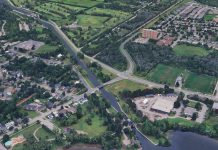
Both Peterborough Public Health and Peterborough Utilities have confirmed Peterborough residents do not need to boil their water as a result of recent weather conditions.
The clarification comes after information was widely shared online that a “boil water advisory” had been issued.
The confusion arose from a May 5th notification from the City of Peterborough’s Emergency and Risk Management Division. The notification advised that, as a result of the current watershed and weather conditions, the city’s wastewater treatment plant is now in secondary by-pass mode, and the Park Street pumping station is in full by-pass mode.
The notification further stated “Residents downstream of these locations who draw water from the river are advised to take necessary precautions and boil water.” Some media outlets reported this guidance as a formal “boil water advisory” and this information was shared widely online, creating confusion and concern.
On Saturday (May 6), Peterborough Public Health issued a media release to Peterborough residents to clarify there is no significant risk to public health from drinking water as a result of recent weather conditions. Peterborough Utilities also issued a statement on social media on May 6 that its customers do not need to boil water.
Our drinking water has not been impacted by the weather conditions surrounding our service area. Our customers do not need to boil water.
— ptbo_utilities (@ptbo_utilities) May 6, 2017
While the City of Peterborough described its notification as a “boil water advisory”, Peterborough Public Health has advised kawarthaNOW that, in situations where drinking water is unsafe, the health unit would issue a formal Boil Water Advisory in consultation with the Ministry of Environment and Climate Change and Peterborough Utilities.
In its May 6th media release, Peterborough Public Health also indicated there should be no significant risk to those downstream of the city’s wastewater treatment plant, although the health unit does recommend people who live south of the plant and who draw their water directly from the river should check that their water treatment systems are functioning properly.
On Sunday (May 7), the City of Peterborough withdrew its advice for downstream residents who draw water from the river to boil water.
“The good news is that wastewater entering the Otonabee River is still 99 per cent treated so with the current volumes and rate of flow there should be no significant risk to those downstream and there is no serious risk to public health,” said Dr. Rosana Salvaterra, Medical Officer of Health. “However, this is still a good reminder to all residents who draw water from wells to take the necessary precautions when flooding occurs to prevent illness.”
The health unit also recommends that residents who draw water from wells should ensure their wells are safe by testing regularly and using a method of disinfection prior to drinking, especially during flooding periods. Water from flooded wells can be treated and made safe for drinking by rapidly boiling the water for at least one minute or by adding two drops of household bleach per one liter of water, stirring, and allowing the water to sit for 30 minutes before use.
For more information about well water safety, well testing, and how to stay safe during a flood, visit www.peterboroughpublichealth.ca.


























